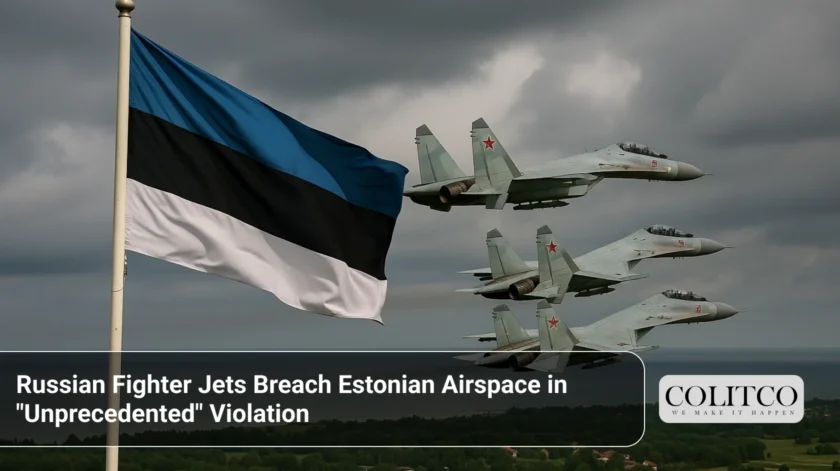Three Russian MiG-31 fighter jets violated Estonian airspace on September 19th, 2025, in what officials described as an “unprecedentedly brazen” incursion that has intensified tensions along NATO’s eastern flank.
The 12-minute violation near Vaindloo Island in the Gulf of Finland prompted Estonia to invoke NATO’s Article 4 consultations and triggered an immediate military response from alliance forces.
Details of the Airspace Violation
Estonian Foreign Minister Margus Tsahkna confirmed the three Russian MiG-31 fighter jets entered Estonian airspace without permission and remained there for approximately 12 minutes. The incident occurred over the Gulf of Finland near Vaindloo Island, a small strategic location in the Baltic Sea.
BREAKING:
Three Russian MiG-31 fighters flew into Estonian airspace and headed toward the capital, Tallinn, according to Politico.
The jets circled for about 12 minutes before NATO scrambled Italian F-35s to repel them.
— Visegrád 24 (@visegrad24) September 19, 2025
Italian F-35 fighters stationed in Estonia as part of NATO’s Baltic Air Policing Mission, along with Swedish and Finnish aircraft, responded to the intrusion. NATO forces successfully intercepted the Russian jets and forced them to retreat.
The violation marks the fifth time in 2025 that Russian aircraft have breached Estonian airspace, representing a significant escalation in Moscow’s testing of NATO boundaries.
NATO’s Swift Response and Article 4 Activation
Estonian Prime Minister Kristen Michal announced that Estonia had requested NATO Article 4 consultations following the “totally unacceptable” violation. Article 4 allows member states to call for discussions when their territorial integrity or security is threatened.
BREAKING:
Estonia officially announces that it’s invoking NATO Article 4 after today’s 12-minute long violation of Estonia’s airspace by three Russian fighter jets
🇪🇪🇷🇺 pic.twitter.com/tetpqyZeJa
— Visegrád 24 (@visegrad24) September 19, 2025
NATO spokesperson Allison Hart confirmed the organization had responded immediately and intercepted the Russian aircraft, calling it “yet another example of reckless Russian behaviour and NATO’s ability to respond“.
The alliance’s response demonstrated the effectiveness of recently launched Operation Eastern Sentry, a comprehensive defense initiative established to counter Russian aggression along NATO’s eastern flank.
Operation Eastern Sentry: NATO’s Strategic Response
NATO Secretary General Mark Rutte announced the launch of “Eastern Sentry” on September 12th, 2025, a military activity aimed to bolster NATO’s posture along the eastern flank. The operation was triggered by Russian drone incursions into Polish airspace just days earlier.
The operation includes:
- Enhanced air defense capabilities across the Baltic states to Bulgaria
- Integration of advanced counter-drone technologies
- Flexible deployment of NATO assets based on threat assessment
- Coordination between multiple allied nations
Denmark has committed two F-16 fighters and an anti-air warfare frigate, France will contribute three Rafale jets, and Germany will deploy four Eurofighter aircraft.
Pattern of Russian Aggression
The Estonian incident is part of a concerning pattern of Russian airspace violations across NATO territory in September 2025:
September 9-10: At least 19 Russian drones crossed into Polish airspace during a major Russian aerial assault against Ukraine
September 19: Russian fighter jets violated Estonian airspace
September 19: Russian fighter jets conducted a “low-level pass” over a Polish oil platform in the Baltic Sea
International Condemnation and Security Implications
EU Foreign Policy Chief Kaja Kallas called the incursion “an extremely dangerous provocation,” while European Commission President Ursula von der Leyen called for EU member states to approve a 19th sanctions package against Moscow.
Today’s violation of Estonia’s airspace by Russian military aircraft is an extremely dangerous provocation.
This marks the third such violation of EU airspace in days and further escalates tensions in the region.
The EU stands in full solidarity with Estonia (1/2)
— Kaja Kallas (@kajakallas) September 19, 2025
Polish Prime Minister Donald Tusk stated that recent Russian drone incursions brought Poland “the closest to an armed conflict since the Second World War”.
The violations demonstrate Russia’s systematic strategy to test NATO’s resolve and capabilities while remaining below the threshold that would trigger Article 5’s collective defense provision.
Economic and Strategic Impact
The escalating tensions have broader implications for regional security and economic stability. Estonia’s position as a key Baltic state makes it crucial for European energy security and critical mineral supply chains.
Australia’s mining sector, including companies focused on critical minerals, may benefit from increased demand for secure supply chains as geopolitical tensions reshape global trade relationships.
The incident highlights the importance of maintaining robust defense capabilities and secure supply chains for essential materials, particularly as global mining operations face increasing geopolitical pressures.
Russia’s Official Response
Russia’s Defense Ministry denied the allegations, claiming their aircraft “did not deviate from the agreed-upon route and did not violate Estonian airspace,” stating the flights were conducted over “neutral waters of the Baltic Sea“.
However, NATO officials and multiple European partners have rejected these denials, citing clear evidence of airspace violations.
Strategic Implications for NATO’s Eastern Flank
The Estonian airspace violation represents a significant test of NATO’s deterrence capabilities and collective resolve. The alliance’s rapid response through Operation Eastern Sentry demonstrates its commitment to defending every inch of allied territory.
Since NATO’s founding in 1949, Article 4 has been invoked eight times, most recently by Poland on September 10th, 2025, highlighting the unprecedented nature of current tensions.
Investment and Market Response
Defense sector stocks have seen increased interest as investors recognize the growing importance of military preparedness. The incidents have reinforced the need for robust defense spending and technological advancement across NATO nations.
The geopolitical tensions may also impact commodity markets, particularly those involving Australian mining companies that serve as alternative suppliers to European markets seeking to reduce dependence on Russian resources.
Looking Ahead: Regional Security Outlook
NATO has pledged to bolster defenses along the alliance’s eastern flank in response to recent airspace violations and Russia’s increasingly aggressive use of drones in the region.
The establishment of Operation Eastern Sentry represents a significant shift in NATO’s approach to regional defense, moving from reactive air policing to proactive integrated air defense systems.
Estonia’s request for Article 4 consultations will likely result in enhanced security measures and closer coordination among Baltic allies, potentially affecting regional trade and investment patterns.
Conclusion
The Russian fighter jets’ violation of Estonia’s airspace in 2025 marks a dangerous escalation in regional tensions and highlights the evolving nature of security threats facing NATO’s eastern members.
NATO’s swift response through Operation Eastern Sentry demonstrates the alliance’s commitment to collective defense while revealing the complex challenges of deterring Russian aggression below the Article 5 threshold.
As geopolitical tensions continue to reshape global security landscapes, the incident serves as a stark reminder of the importance of maintaining strong defensive capabilities and secure supply chains in an increasingly uncertain world.
FAQs
Q: How many times has Russia violated Estonian airspace in 2025?
A: This September 19th incident marks the fifth Russian airspace violation of Estonia in 2025, representing a significant escalation in frequency and duration.
Q: What is NATO Article 4 and why did Estonia invoke it?
A: Article 4 allows NATO members to request consultations when their territorial integrity or security is threatened. Estonia invoked it due to the unprecedented nature of the 12-minute airspace violation.
Q: What is Operation Eastern Sentry?
A: A NATO operation launched September 12th, 2025, to enhance defense capabilities along the alliance’s eastern flank, featuring advanced counter-drone technologies and flexible asset deployment.












